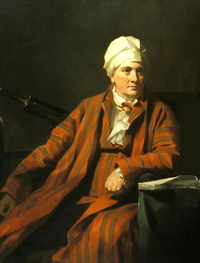John Robison (physicist)
| John Robison | |
|---|---|

Contemporary portrait of John Robison
|
|
| Born |
4 February 1739 Boghall, Baldernock, Stirlingshire |
| Died | 30 January 1805 (aged 65) |
| Citizenship | Great Britain |
| Nationality | Scottish |
| Fields | Physics, Mathematics, Chemistry |
| Institutions | Glasgow University, Edinburgh University |
| Alma mater | Glasgow University |
| Notes | |
|
Residential Member of the Edinburgh Philosophical Society
Fellow of the Royal Society of Edinburgh (1783) Member of the Glasgow Literary Society |
|
John Robison FRSE (4 February 1739 – 30 January 1805) was a Scottish physicist and mathematician. He was a professor of philosophy at the University of Edinburgh.
A member of the Edinburgh Philosophical Society when it received its royal warrant, he was appointed as the first general secretary to the Royal Society of Edinburgh (1783–98). Robison invented the siren and also worked with James Watt on an early steam car. Following the French Revolution, Robison became disenchanted with elements of the Enlightenment. He authored Proofs of a Conspiracy in 1797—a polemic accusing Freemasonry of being infiltrated by Weishaupt's Order of the Illuminati.
His son was the inventor Sir John Robison (1778–1843).
The son of John Robison, a Glasgow merchant, he was born in Boghall, Baldernock, Stirlingshire (now East Dunbartonshire) and attended Glasgow Grammar School and the University of Glasgow (MA 1756). After a brief stay in London in 1758 Robison became the tutor to the midshipman son of Admiral Knowles, sailing with the Royal Navy on General Wolfe's expedition to Quebec and Portugal (1756–62). His mathematical skills were employed in navigation and surveying. Returning to England in 1762, he joined the Board of Longitude — a team of scientists who tested John Harrison’s marine chronometer on a voyage to Jamaica.
...
Wikipedia
